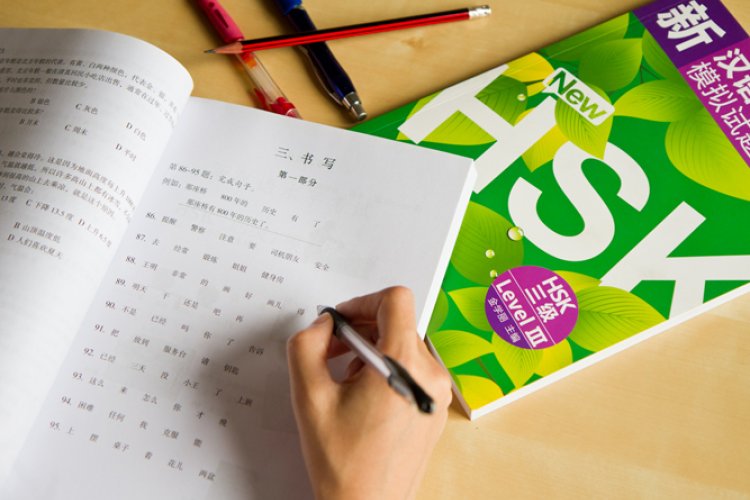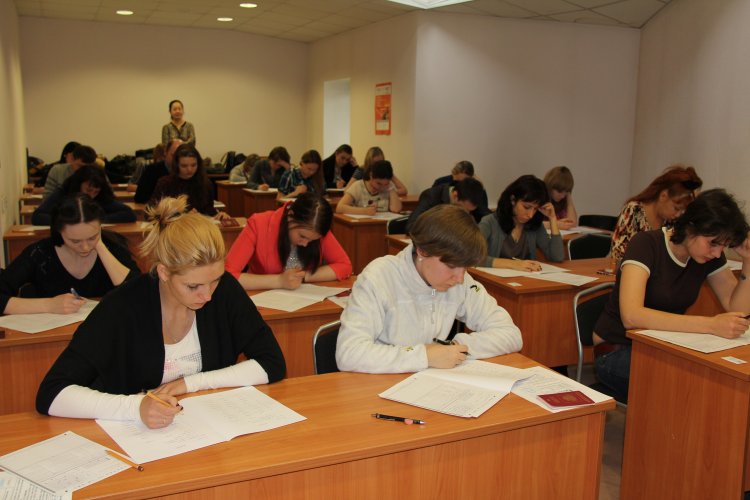Mandarin Month: Remember These 300 Essential Words for Levels 1 and 2 of the HSK
In the lead up to our Mandarin Month mixer on June 24 June 25, where you'll be able to meet with Beijing's best Mandarin schools, we'll be dishing out some language-learning advice on a daily basis. Read on if you don't want to wait to get started on improving your 中文. Mandarin Month is sponsored by Sanfine International Hospital.
When learning a new language, it is important to know basic greetings and words to help you get by. Of course a wide vocabulary doesn't come in an instant; it takes countless hours of reading, practicing, and immersing with native speakers to grow.
READ: Is it Even Worth Taking the HSK Exam?
You might have heard that Chinese has thousands of characters ... and yes, it sounds awful to learn. But don't let that deter your language study as learning (memorizing, recognizing, knowing) 900 characters will help beginners understand and construct simple sentences.
In a previous post, we shared the 100 most basic Chinese characters; in this edition, we list the first 300 words every beginner needs to learn to (somehow) pass the HSK test of Chinese language proficiency. Rregardless of whether you want or don't want to take the HSK, you can bookmark this page and use it as a cheat sheet and check your progress (you can also utilize these apps for a more fun way to test yourself).
HSK Level 1 Words/Phrases
爱 (ài) – to love
八 (bā) – the number 8
爸爸 (bàba) – father
杯子 (bēizi) – cup
北京 (běijīng) – Beijing, the capital of China
本 (běn) – source; origin; measure word for books
不客气 (bù kèqì) – phrase, “You’re welcome”
不 (bù) – no; negative prefix
菜 (cài) – vegetable; dish
茶 (chá) – tea
吃 (chī) – to eat; to destroy; to suffer; to take
出租车 (chūzū chē) – taxi
打电话 (dǎ diànhuà) – to call (by telephone)
大 (dà) – big; large; great
的 (de) – structural and attributive particle
点 (diǎn) – a little bit; point; measure word used for time
电脑 (diànnǎo) – computer
电视 (diànshì) – television
电影 (diànyǐng) – movie; cinema; film
东西 (dōngxī) – thing
都 (dōu) – all, both
读 (dú) – to read; to study
对不起 (duìbùqǐ) – phrase, “I’m sorry” or “Excuse me”
多 (duō) – many
多少 (duōshǎo) – phrase, “How many?” “How much?”
儿子 (érzi) – son
二 (èr) – the number 2
饭店 (fàndiàn) – restaurant
飞机 (fēijī) – airplane
分钟 (fēnzhōng) – minute
高兴 (gāoxìng) – happy; in a cheerful mood
个 (gè) – universal/general measure word
工作 (gōngzuò) – work; job; construction
狗 (gǒu) – dog
汉语 (hànyǔ) – the Chinese language
好 (hǎo) – good; well; suffix to indicate completion or readiness
号 (hào) – ordinal particle; suffix for day of the month
喝 (hē) – to drink
和 (hé) – and; with; together with; union; peace; harmony
很 (hěn) – adverb to indicate degree; very
后面 (hòumiàn) – back; later; rear
回 (huí) – to go back; to return; to answer; to revolve
会 (huì) – to meet; to gather; be able to; union, group, assembly
几 (jǐ) – several; a few; how many
家 (jiā) – home; family; measure word for family, business
叫 (jiào) – to call; to shout
今天 (jīntiān) – today
九 (jiǔ) – the number 9
开 (kāi) – to open, to start
看 (kàn) – to take a look at
看见 (kànjiàn) – to see; to get a sight
块 (kuài) – chunk; piece; unit of currency; measure word for cake, pieces of cloth
来 (lái) – to come; to arrive
老师 (lǎo shī) – teacher
了 (le) – modal particle indicating completed action
冷 (lěng) – cold
里 (lǐ) – inside; interior
六 (liù) – the number 6
吗 (ma) – structural, interrogative suffix
妈妈 (māmā) – mother
买 (mǎi) – to buy
猫 (māo) – cat
没关系 (méiguānxì) – phrase “It doesn’t matter”
没有 (méiyǒu) – to not have; has/have not
米饭 (mǐfàn) – cooked rice
名字 (míngzì) – name
明天 (míngtiān) – tomorrow
哪 (nǎ) – interrogative affix for where
哪儿 (nǎ’er) – “Where?”; wherever; anywhere
那 (nà) – that, those
呢 (ne) – interrogative particle for things already mentioned
能 (néng) – to be able to; to be capable of; ability; able; capable; capability
你 (nǐ) – you
年 (nián) – year
女儿 (nǚ’ér) – girl; daughter
朋友 (péngyǒu) – friend
漂亮 (piàoliang) – beautiful; pretty
苹果 (píngguǒ) – apple
七 (qī) – the number 7
前面 (qiánmiàn) – ahead; above; in front; preceding
钱 (qián) – money; coin
请 (qǐng) – please; to ask; to invite; to request something
去 (qù) – to go; to go to; to remove
热 (rè) – hot; heat; to warm up; to heat up
人 (rén) – person; man; people
认识 (rènshì) – to know; to recognize; awareness; knowledge
三 (sān) – the number 3
商店 (shāngdiàn) – store; shop
上 (shàng) – on
上午 (shàngwǔ) – morning
少 (shǎo) – little; few; lack
谁 (shéi) – who
什么 (shénme) – what; something
十 (shí) – the number 10
时候 (shíhòu) – time; moment; period
是 (shì) – to be; yes
书 (shū) – book
水 (shuǐ) – water; liquid; drinking water
水果 (shuǐguǒ) – fruit
睡觉 (shuìjiào) – to go to sleep; to go to bed
说 (shuō) – to speak; to explain; to scold
四 (sì) – the number 4
岁 (suì) – measure word for years
他 (tā) – he; him; another; other
她 (tā) – her
太 (tài) – greatest; highest; too much; very; extremely
天气 (tiānqì) – weather
听 (tīng) – to listen; to hear; measure word for canned beverages
同学 (tóngxué) – classmate
喂 (wèi) – hello; hey
我 (wǒ) – I; me; my
我们 (wǒmen) – we; us; ours
五 (wǔ) – the number 5
喜欢 (xǐhuān) – to like
下 (xià) – below; down; downwards; later; lower; to decline; to go down
下午 (xiàwǔ) – afternoon
下雨 (xià yǔ) – to rain; rainy
先生 (xiānshēng) – mister; husband; doctor
现在 (xiànzài) – at the moment; at present; current; modern; now; nowadays
想 (xiǎng) – to believe; to miss; to think; to want to; to wish
小 (xiǎo) – small; tiny; young
小姐 (xiǎojiě) – miss; young lady
些 (xiē) – measure word to indicate few; several; some
写 (xiě) – to write
谢谢 (xièxiè) – phrase “Thank you”; to thank
星期 (xīngqí) – week
学生 (xuéshēng) – student
学习 (xuéxí) – to study; to learn
学校 (xuéxiào) – school
一 (yī) – the number one; single; entire; whole
一点儿 (yī diǎn er) – phrase “A little bit”
医生 (yīshēng) – doctor
医院 (yīyuàn) – hospital
衣服 (yīfú) – clothes
椅子 (yǐzi) – chair
有 (yǒu) – to have; to be; to exist; there is/are
月 (yuè) – month; the Moon
再见 (zàijiàn) – goodbye; phrase “See you again”
在 (zài) – preposition in; at; on; modifier to indicate an action in progress
怎么 (zěnme) – “What?” “How?” “Why?”
怎么样 (zěnme yàng) – phrase “What’s up?” “How are things?”
这 (zhè) – this; these
中国 (zhōngguó) – China
中午 (zhōngwǔ) – noon
住 (zhù) – to dwell; to live; to reside; to stay; to stop
桌子 (zhuōzi) – desk; table
字 (zì) – letter; word; character
昨天 (zuótiān) – yesterday
做 (zuò) – to compose; to do; to engage in; to make; to produce; to serve as; to write
坐 (zuò) – to sit; to take a seat; to take a bus or a plane; to bear fruit
HSK Level 2 Words/Phrases
吧 (ba) – particle to indicate polite suggestion
白 (bái) – white; bright; empty; snowy; pure; to explain; to stare blankly
百 (bǎi) – hundred; numerous
帮助 (bāngzhù) – to assist; to help; aid; assistance
报纸 (bàozhǐ) – newspaper
比 (bǐ) – particle to indicate comparison; to compare; to contrast
别 (bié) – to do not; must not; to distinguish; to separate
宾馆 (bīnguǎn) – guesthouse
长 (chǎng) – long; length
唱歌 (chànggē) – to sing a song
出 (chū) – to come out; to go beyond; to go out; to occur; to happen
穿 (chuān) – to dress; to put on; to wear; to bore through; penetrate; pierce pass through
次 (cì) – next in sequence; second; secondary; sub-; inferior quality; substandard; order
从 (cóng) – from; passing through; through; via
错 (cuò) – blunder; error; fault; mistake; uneven; wrong
打篮球 (dǎ lánqiú) – to play basketball
大家 (dàjiā) – everyone; everybody
到 (dào) – to arrive to (a place); to go; until (a period); up to
得 (dé) – particle used after a verb or adjective to link it to following phrase indicating effect, degree, possibility
等 (děng) – to await; to wait for; after; as soon as; class (grade); et cetera; and so on; once
弟弟 (dìdì) – younger brother
第一 (dì yī) – first; number one
懂 (dǒng) – to know; to understand
对 (duì) – right; correct; towards; at; for
房间 (fángjiān) – room
非常 (fēicháng) – exceptional; extraordinary; extreme; unusual; very
服务员 (fúwùyuán) – attendant; customer service staff; waiter
高 (gāo) – above average; high; loud; tall; your (honorific)
告诉 (gàosù) – to inform; to let know; to tell
哥哥 (gēgē) – older brother
给 (gěi) – to (someone); for; for the benefit of; to give; to allow; to do sth (for sb); (passive particle)
公共汽车 (gōnggòng qìchē) – bus
公司 (gōngsī) – business, company; corporation; firm
贵 (guì) – expensive; noble; precious
过 (guò) – particle used after a verb to indicate the completion of an action
孩子 (háizi) – child
还 (hái) – also; as well; even more; still; still more; too; yet
好吃 (hào chī) – delicious; tasty
黑 (hēi) – black; dark
红 (hóng) – red; bonus; popular
火车站 (huǒ chēzhàn) – train station
机场 (jīchǎng) – airport
鸡蛋 (jīdàn) – chicken egg
件 (jiàn) – component; item; measure word for clothes, events, things
教室 (jiàoshì) – classroom
姐姐 (jiějiě) – older sister
介绍 (jièshào) – to brief; to introduce; to let know; to present: to recommend; to suggest
近 (jìn) – approximately; close to; near
进 (jìn) – to advance; to come (or go) into; to enter; to receive or admit; to eat or drink; used after a verb)
就 (jiù) – at once; as early/soon as; already; only; right away; to accomplish; to approach; to move towards; to undertake; with regard to; concerning
觉得 (juédé) – to feel; to think
咖啡 (kāfēi) – coffee
开始 (kāishǐ) – beginning; initial; to begin; to start
考试 (kǎoshì) – examination; test
可能 (kěnéng) – maybe; might (happen); perhaps; possible; possibility; probable; probability
可以 (kěyǐ) – able to; can; may; possible
课 (kè) – class; course; lesson; subject
快 (kuài) – gratified; pleasant; pleased; fast; quick; rapid; speed; clever; sharp (of knives or wits); to make haste
快乐 (kuàilè) – happy
累 (lèi) – tired; weary; to strain; to wear out; to work hard
离 (lí) – to be away from; to leave; without (sth); independent of
两 (liǎng) – two (quantities); both; ounce; some
零 (líng) – the number zero; fractional; fraction; fragmentary; odd (of numbers)
路 (lù) – path; road; way
旅游 (lǚyóu) – journey; tour; tourism; travel; trip
卖 (mài) – to sell; to spare no effort; to show off or flaunt
慢 (màn) – slow
忙 (máng) – busy
每 (měi) – each; every
妹妹 (mèimei) – younger sister
门 (mén) – door; doorway; gate; gateway; opening; valve; switch; classifier for lessons, subjects, branches of technology
面条 (miàn tiáo) – noodles
男 (nán) – male; man
您 (nín) – you (polite)
牛奶 (niúnǎi) – cow’s milk
女 (nǚ) – female; woman
旁边 (pángbiān) – beside; lateral; side; to the side
跑步 (pǎobù) – to run; to walk quickly
便宜 (piányí) – cheap; inexpensive
票 (piào) – ballot; bank note; ticket
妻子 (qīzi) – wife
起床 (qǐchuáng) – to get up
千 (qiān) – thousand
铅笔 (qiānbǐ) – pencil
晴 (qíng) – clear; fine weather
去年 (qùnián) – last year
让 (ràng) – to permit; to yield
日 (rì) – day; day of the month; date; the Sun; abbreviation for Japan
上班 (shàngbān) – to be on duty; to go to the office; to go to work; to start work
身体 (shēntǐ) – body; health
生病 (shēngbìng) – to fall ill; to sicken
生日 (shēngrì) – birthday
时间 (shíjiān) – time; period;
事情 (shìqíng) – affair; business; matter; thing
手表 (shǒubiǎo) – wrist watch
手机 (shǒujī) – cellphone
说话 (shuōhuà) – to say; to speak; to talk; to tell stories; talk; word
送 (sòng) – to carry; to deliver; to give (as a present); to present (with); to see off; to send
虽然 … 但是 … (suīrán … dànshì …) – although … still …; even if … nevertheless …
它 (tā) – it
踢足球 (tī zúqiú) – to play soccer (football)
题 (tí) – topic; exam question; problem for discussion; subject; to inscribe; to mention
跳舞 (tiàowǔ) – to dance
外 (wài) – external; foreign; in addition; outside
完 (wán) – to be over; to finish; complete; entire; whole
玩 (wán) – toy; something used for amusement; to have fun; to keep something for entertainment; to play
晚上 (wǎnshàng) – evening
往 (wǎng) – to go (in a direction); to; towards; bound for; past; previous
为什么 (wèishénme) – “Why?” “For what reason?”
问 (wèn) – to ask
问题 (wèntí) – issue; problem; question; topic
希望 (xīwàng) – to desire; to wish for; hope
西瓜 (xīguā) – watermelon
洗 (xǐ) – to wash; to bathe
小时 (xiǎoshí) – hour
笑 (xiào) – laugh; smile
新 (xīn) – beginning; new
姓 (xìng) family name; surname; name
休息 (xiūxí) – to rest
雪 (xuě) – snow; snowfall; to have the appearance of snow; to clean; to wipe away/off/out
颜色 (yánsè) – color
眼睛 (yǎnjīng) – eye
羊肉 (yángròu) – lamb mutton
药 (yào) – cure; drug; medicine
要 (yào) – to want; will; going to; important; vital; may; must
也 (yě) – also; too
一下 (yīxià) – all at once; all of a sudden; in a while; once; one time; to give something a try
已经 (yǐjīng) – already
一起 (yīqǐ) – altogether; together; in the same place; with
意思 (yìsi) – desire; idea; meaning; opinion; wish
因为 … 所以 … (yīnwèi … suǒyǐ …) – because … thus …; on account of … then …
阴 (yīn) – overcast (weather); cloudy; shady; Yin (the opposite of Yang); negative (electric.); feminine; moon
游泳 (yóuyǒng) – to swim
右边 (yòubiān) – right side; right, to the right
鱼 (yú) – fish
远 (yuǎn) – distant; far; remote
运动 (yùndòng) campaign; movement; sports
再 (zài) – again; another; once more; second; then
早上 (zǎoshang) – early morning; phrase for “Good morning!”
丈夫 (zhàngfū) – husband
找 (zhǎo) – to call on; to find; to look for; to seek; to try to find; to give change; to return;
着 (zhe) – particle attached after a verb to indicate action in progress
真 (zhēn) – really; truly; indeed; real; true; genuine
正在 (zhèng zài) – in the process of (doing something or happening); while (doing)
知道 (zhīdào) – to know; to be aware of
准备 (zhǔnbèi) – preparation; to prepare
走 (zǒu) – to run; to walk; to go; to go away; to leave; to move (vehicle); to visit; to change (shape, form, meaning)
最 (zuì) – particle to indicate superlative degree; most; the most; -est
左边 (zuǒbiān) – left; the left side; to the left of
Keep on track with your studies with all of our 2017 Mandarin Month content here, and don't forget to register for our June 24 June 25 mixer here.
If you are interested in becoming an exhibitor at our Mandarin Month Mixer on June 24 June 25, please call 5941 0368 or email sales@truerun.com. For media partnership opportunities, please call 5941 5379 or email marketing@truerun.com.
More stories by this author here.
Email: andypenafuerte@beijing-kids.com
Instagram: @coolkidandy
Photo: Flickr







